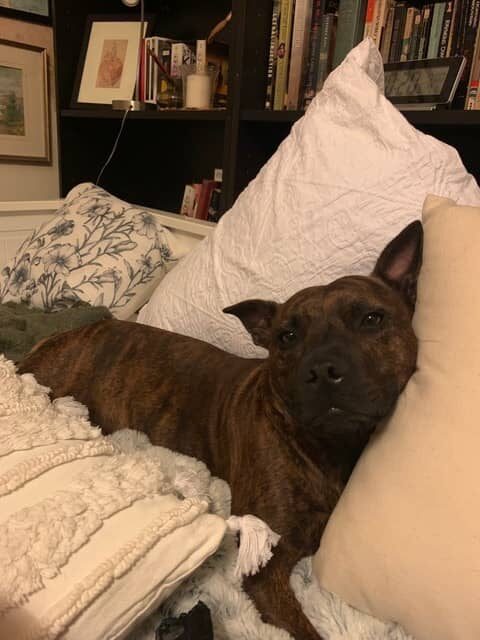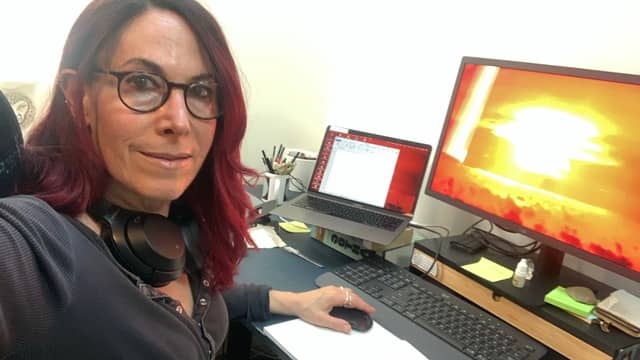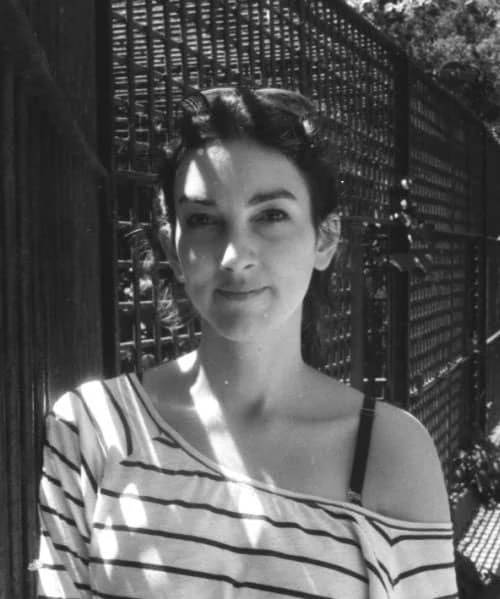
In “Hole World” by J.S. Breukelaar, the world as we know it has undergone a sudden vast and gory change of management. The few human survivors are trapped in their tiny, restricted roles, mostly isolated from each other and forced to continue with horrifying daily tasks. And yet even in this bleak, bloody, and terrifying world, there is hope.
Described by This is Horror Magazine as a “killer female author who is smashing boundaries with each word she writes,” J.S. Breukelaar is an award-winning American-Australian writer and poet. Her short story collection, Collision: Stories was a Shirley Jackson Award finalist and won the Aurealis Award and Ditmar Award for Best Collection in 2020. She is also the author of three novels and a novella, including The Bridge (winner of the Ditmar Award for Best Horror novel), and the cult hit American Monster, soon to be reissued by Clash Books, as well as stories in Apex, The Dark, Black Static, Lightspeed, Tiny Nightmares, and others, including multiple Years' Bests. Her new novella, Remedy, is out in 2024 from PS Publications. She lives with her family in Sydney surrounded by far too many good coffee shops. You can find her at thelivingsuitcase.com and elsewhere at @jsbreukelaar.
Marissa van Uden: Thank you so much for joining me today. I read “Hole World” a couple times over the last weeks and couldn’t stop thinking about it. What I loved was how the story is a cosmic horror, but the unknowable, unseen alien interacts with humans in this horrifyingly familiar, everyday way, with task lists and performance reviews and product inventory. It reminded me of the film Under the Skin (2013), which does a similar thing. Could you share a bit about the writing process of making a Wholefoods loading bay into this terrifying cosmic horror setting. I can only imagine it was a lot of fun to write?
J.S. Breukelaar: Thank you. I’m so glad it resonated. I loved Under the Skin, and agree it effects a similar collision between mundane and cosmic terrors. I began the story in 2022, as a flash fiction, part of a monthly challenge with my writing group, and I guess I was just thinking about corporatization—and what a deadly joke it is and how full of holes the hype is, and yet we buy it, literally. So that bit was fun to write. Taking the piss out of the jargon and the layout of one of these incredibly seductive, labyrinthine lifestyle spaces meant taking the piss out of myself for being as drawn to their promises as anyone else. I can get stuck in a Wholefoods for hours … All the bright colors and all that choice, and all the beautiful grown-up and together-looking shoppers who, to me, look like they know exactly what they want and who they are, but who might, like in the story, be monsters in disguise. It’s kind of an act of self-flagellation hanging out in a Wholefoods, or an Apple store. An element of kink, or forbidden something, everyone in some kind of drag, performing being human, which is what I tried to convey in the story, too.
Once I got into Justin’s struggle, at the end of the world, to break free, things got real though, and he and Kelly broke my heart.
MVU: Maybe it’s just me but I really felt the undercurrent of the lockdowns in this piece, and I mean that in a very complimentary way. It has the horrors of the outside world, the essential workers moving through an empty world, the people indoors, isolated from each other and yet manacled to their jobs by long cables that disappear into the walls. Was this a conscious nod to the lockdown experience on your part, or was the story even written during that time?
JSB: I began the story in 2022, but like everyone, I hadn’t recovered from the lockdowns, so this was definitely a delayed response. And I’m glad that came across. The idea that loneliness is a disease, a ravenous monster, was brought home to everyone on the planet during the pandemic, and that’s what I think I was processing through Justin utterly alone in this vast temple to consumerist excess, except for the sentient shackle around his ankle.
MVU: Justin often sees himself as Winston from 1984, taking Winston’s story as a cautionary tale and even making decisions based on the novel. Was 1984 an early inspiration for this story, or did the parallels start to emerge during the writing process? Can you tell us a bit about that?
JSB: Yes, that totally emerged during the writing process and was completely unplanned. Which was annoying, because I hadn’t read it since high school, so I had to have a refresher skim. The parallels started becoming clearer as Justin’s struggles emerged—the struggle not to love his captors, not to eat the, um, inventory, which would make him one of them, to hold onto hope, because once they took that away, they’d have his humanity, and then he’d literally be dead meat. He writes a diary in the beginning, like Winston, but gives it up in case they use it against him, as in 1984, but giving up puts him one step closer to becoming like them. So, he is in a dilemma. And all of that kind of came through as I got to know him better.
 Jenny’s adorable writing companion.
Jenny’s adorable writing companion.
MVU: You teach literature and writing at Sydney University and Western Sydney University, and also run online classes with LitReactor. I had the pleasure of taking your Writing the Weird class a few years ago and can highly recommend it. I got so much out of that class. Could you share with our readers a little bit about what you love about this genre, and what were your first Weird horror reads that really drew you in?
JSB: Thank you so much! I love Weird horror, partly because way back when, it gave me a safe space for writing unclassifiable literature of dread. It allowed me to experiment with gore, with science fiction, with dark fantasy, with folk tales, with crime, in order to show characters so desperate to escape their own humanity that they failed to realize that was what made them human. Characters running in place, basically. It allowed me to have fun with tropes, to be shamelessly cinematic, to bumble around with robots and multiverses and witches and zombies and cowgirls—just so long as somewhere in all that chaos, I could find a character who I loved, and who I felt was worth saving, even if I failed to do so.
Weird movies possibly came first for me—Lynch and Cronenberg and early Peter Jackson among others. But the first Weird read that blew the head off everything was Kelly Link’s story “Light,” and then I read everything she wrote, and I’m still reading it. Then Lena Krohn’s Tainaron. Then I went back to Ligotti and Cisco and the others. Then forward to Kathe Koja, Kaaron Warren, Stephen Graham Jones, Brian Evenson. Then so so many others. Recently, Yoko Ogawa and Mariana Enriquez.
MVU: Oh my gosh I LOVE early Peter Jackson! Bad Taste and Brain Dead were among my first loves in horror film. Such ridiculous brilliance. Everyone, go watch his early splatter-horror comedies. This is an amazing list of inspirations too. Are there any underrated or lesser-known Weird horror authors you’d love to see read and talked about more?
JSB: Well, firstly, few authors, myself included, who have written weird fiction think of themselves as Weird horror authors. I mean partly in terms of refusing classification, maybe, or preferring to be known as simply a horror writer, or maybe just a writer, or one who writes horror, or science fiction, or dark shit, some of it weirder than others. One of the lesser-known writers of Weird horror is Emma J. Gibbon, whose collection Dark Blood Comes from the Feet, is a book I’d like us all to talk about. “Cellar Door” made me forget to breathe. But each story is terrifying—weirder, and sadder, and punker than anything I’ve read in a while.
MVU: It’s common to ask authors for one piece of writing advice they’d give to other writers, but I’m curious, what is one piece of advice you’d give to new teachers of writing—something you wish you’d been told earlier on or a personal teaching philosophy you live by?
JSB: That’s a great question. Love and fear. If you can create a safe space for both love of the craft and the fear of failing at it—without either, art is impossible—your work is done.
MVU: What does a good writing day look like for you? Do you have any rituals or routines that help you get into the writing flow?
JSB: A good writing day is 1,000 words by lunch time. I do have the basic rituals—get up, walk the dog, caffeinate, and put on some music. That’s it basically.
 The author getting set up in her new office.
The author getting set up in her new office.
MVU: What about that other key side of writing: the practice of reading. How would you describe your reading habits? What times of the day or week do you read, what’s your favorite reading spot, and do you read fiction critically and take notes, or just fully immerse yourself in the story?
JSB: So many books, so little time, right? While I try and devote some part of the day to it, I generally have to wait until the evening. My favorite spot is on a day bed upstairs with my Staffordshire bull terrier Eleanor sprawled on top of me snoring. I do tend to have a pencil nearby to jot down ideas sparked by the story, or reference things to look up later, unless it’s a book that I’m reading purely as a guilty pleasure—but even then, I’m forever bookmarking.
MVU: I can totally relate to that … I end up with so many notes and so many bookmarks. For readers excited to check out your longer form works, which of your novels would you recommend they start with and why?
JSB: I’d love to pump The Bridge, which came out in 2020. It’s about twin girls rescued from a cult by three very strange sisters—a witch, an assassin, and a groupie—and it goes back in forth in time from the twins' younger selves to their present day selves, similar to the structure of Yellow Jackets, which I thought did it brilliantly.
MVU: Thank you so much for joining us to talk about “Hole World” and writing. Lovely day for it. :) Are you working on anything exciting at the moment that you can talk about here? And do you have any upcoming releases you’d like to share?
JSB: Nice night for it. ☺ I am currently working on a novel set in a haunted cabin park by the sea. And I have a new novella coming out next year from PS Publications called Remedy, which is a cosmic body horror story about being trapped in a world not your own.









